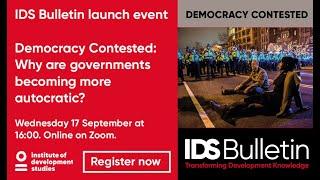
https://www.ids.ac.uk/news/identity-based-narratives-fuelling-rise-in-au...
As the world experiences a decline in democracy, nearly three out of four people now live in countries with autocratic governments. This democratic erosion is not confined to the global South but includes traditionally stable democracies such as North America and Western Europe, making it a global phenomenon.
Why do voters support autocratic leaders?
The IDS Bulletin reveals that autocratic leaders are using identity-based narratives such as race, immigration and communal sentiments to manipulate information and spread emotionally charged disinformation to influence citizens and their voting choices. The shift in voter behaviour from voting for redistribution to voting against perceived identity threats to national or cultural identity is leading to a rise in populist narratives. Social media and algorithm-driven content help amplify these narratives.
The Bulletin suggests that many regimes come into power through elections where citizens actively vote for leaders in loyalty to their political inclination or ideology, their affinity to a religious, cultural, linguistic, or ethnic identity or hostility towards any other identity group or way of thinking. It enables leaders such as – US President Donald Trump, Indian Prime Minister Narendra Modi, former President of Philippines Rodrigo Duterte, gain popularity and consensus.
Once in power, these leaders weaken democratic institutions using information manipulation to maintain control. For example, in Europe, far right leaders are using social media to learn from each other and mobilise anti-immigrant and anti-gender actors across borders gaining international insight.
Shandana Khan Mohammad, Research Fellow at the Institute of Development Studies said:
“Political leaders manipulate information to influence citizens. This has long been the case but in an era of digital media, the scope for reaching voters with misinformation has reached new heights.
“However, there is still room for optimism. Citizens are mobilising, in countries across the world to protest poor governance and human rights abuses. This citizen action will be integral to upholding the future of democracy.”
Possibilities for resistance against democratic erosion
The Bulletin suggests that despite the rise in autocracy, citizens continue to play an active role in defending democratic institutions by organising, networking, mobilising and advocating for strong democracies. Citizens are also using social media as a place for resistance against autocratic leaders.
India’s 2024 general election results reflected grassroots mobilisation, especially by Dalit communities, against the authoritarian governance of Modi’s Bharatiya Janata Party (BJP) which led to a significantly weakened mandate for the party.
Two-thirds of Africans express their preference for democratic forms of government despite economic downturns, corruption, and growing authoritarianism. Youth-led movements in Nigeria, Senegal, and Sudan are using social media to challenge autocratic regimes. The Bulletin also identifies future opportunities for the civil society in Africa to build networks for advancing democracy.
In Europe, citizens are using social media to counter far-right populism. In Italy, the ‘6000 Sardines against Salvini’ movement emerged on Facebook against the right-wing coalition led by Matteo Salvini which received widespread attention leading to a call for transparency in elections. The movement expanded beyond Italian borders mobilising people against populist leaders.
Marjoke Oosterom, Research Fellow at the Institute of Development Studies said:
“Social media is not just a tool for manipulation; it’s also a space for resistance.
“It is important to have accountability checks in place with reliable information and we need to keep investing in protecting the civic spaces and empowering citizens to reclaim and reshape democratic institutions.”
The IDS Bulletin ‘Democracy Contested’ features a collection of articles from a range of authors and experts in the field. It reflects on IDS’s work published 30 years ago, offering insights into how the state of democracy has changed over the past three decades.









